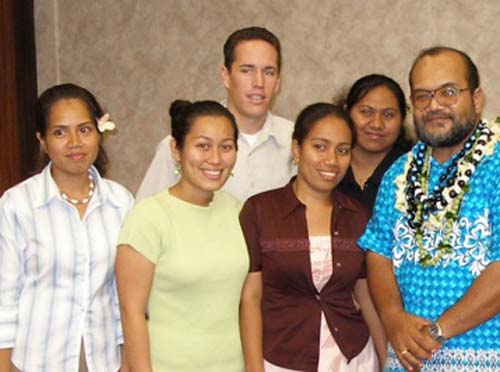
Nandni Vandhana, Kalesi Mele and Leni Dalavera in Suva A USP academic has expressed concern about what he says is the continuing “misappropriation” of Pacific Islands’ creative properties.
A USP academic has expressed concern about what he says is the continuing “misappropriation” of Pacific Islands’ creative properties.
Senior lecturer in education Teweiariki Teaero says others are stealing and copyrighting Pacific Island intellectual property.
He was speaking at a public lecture at the USP’s Laucala Campus in Suva.
He gave an example of mat weaving patterns belonging to a Kiribati family that were allegedly claimed by an artist from New Zealand.
This artist modified the images and called it her own, claimed Teaero.
The patterns, he said, originally belonged to the family of Katimiri and Aroita of Nikunau Island in Kiribati. They can no longer use it due to copyright.
Teaero is a PhD candidate who is researching the misappropriation of Pacific arts, knowledge and inventions.
Creators lose out
Works originating from the Pacific have been commercialised, with little credit given to the rightful indigenous creators, Teaero says.
The idea of the tamana pump, which was created by a Kiribati native, has been commercialised by a US company in Chicago.
The invention earns the company between US$2.5 mllion to $5 million in revenue annually, Teaero reveals.
His thesis, entitled "Kamanoan Katei Ma Anua", advocates legal protection of traditional knowledge and the cultural expression of the people of Kiribati.
The World Intellectual Protection Organisation (WIPO) supports his work. WIPO is a specialised agency of the United Nations (UN) dedicated to the development of balanced and accessible intellectual property.
Teaero believes indigenous knowledge systems need to be captured in all media forms before they are lost or forgotten. He believes current Kiribati laws are inadequate when it comes to the protection of cultural forms of expression.
Working as a consultant for both WIPO and the Pacific Islands Forum Secretariat (PIFS), Teaero hopes his research will help pass a policy for the protection of traditional knowledge and cultural forms of expression.
Clmate change
Teaero’s work couldn’t have come at a better time as Kiribati is currently faced with climate change and the possible relocation of the population to another country in the not too distant future.
“Kiribati is facing an environmental disaster and given the country’s limited economic base, we don’t want to sit and wait,” says Teaero.
“The nature and essence of being Kiribati is in danger of being severely compromised or even lost,” says Teaero
Meanwhile, work on the implementation of the Traditional Knowledge (TK) Action Plan in several Pacific Island countries is progressing well, says the secretary general of the PIFS, Tuiloma Slade.
He says several countries are already setting up the necessary policy and legislative frameworks.
“While the Forum Island countries are at different stages in the development of their policy and legislative frameworks on TK, the growing awareness of the importance of traditional knowledge and culture for the overall welfare of the region is commendable,” he said.
Slade said progress on the implementation of the TK Action Plan in the Cook Islands, Fiji, Kiribati, Palau, Papua New Guinea, Solomon Islands and Vanuatu was discussed at a regional seminar in August this year.
Conference topic
The PIFS’s trade policy officer, Douveri Henao, also spoke on the issue during the recent Oceanic Conference on Creativity and Climate Change at the USP’s Laucala Campus.
He said Fiji, Papua New Guinea and Palau were in the intermediary stages of formulating TK bills.
On the benefits of having a legal process such as the TK Action Plan, Douveri said Pacific islanders would have the absolute right over their traditional knowledge and cultural forms of expression.
He said the unauthorised use of Pacific island traditional heritage would lead to severe penalties.
According to Slade, the first part of the Action Plan is to develop national systems of protection setting out new rights and obligations in TK that will complement existing forms of protection for intellectual property.
The second part involves the development of cultural industries in the region through activities that promote the commercialisation of TK.
According to Slade, implementing the action plan is not without challenges.
“The challenges faced by the Forum Island countries in the implementation of the TK Action Plan include awareness on commercialising TK and the availability of technical expertise to support and sustain government, the private sector and the non-government organisations in dealing with TK issues,” he says.
Teaero has spoken highly of the action plan.
He says all specialised forms of knowledge and cultural forms of expressions must be protected under copyright law.
Nandni Vandhana, Kalesi Mele and Leni Dalavera are double major student journalists at the University of the South Pacific in Fiji. This article was originally filed for USP’s journalism programme newspaper Wansolwara.



